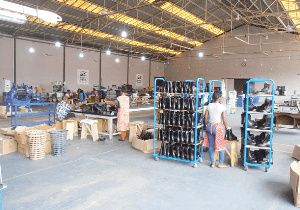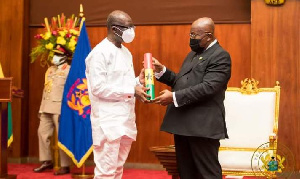Why the idea of Kumasi Shoe Factory closing must remain a rumour

According to a report in the Daily Graphic, the management of the Kumasi Shoe Factory is considering closing the factory over the refusal of the security agencies, particularly the Ghana Armed Forces (GAF), to patronise its boots and shoes.
In 2014, President John Dramani Mahama, made a pronouncement when he visited the factory that, it was going to be the sole manufacturer of all the shoes for the Ghana Armed Forces and other security agencies in the country.
President Mahama actually set the ball rolling when he tasked the factory to produce sandals to be distributed free of charge to school children in deprived communities in the country.
On Monday, May 5, 2014, speaking on TV3’s Midday Live, Head of Communications at the Presidency, Ben Dotsei Malor, disclosed that neighbouring countries have placed orders for shoes from the Defence Industrial Holding Company Limited (DIHOC), which manages the Kumasi Shoe Factory.
In November 2017, management of the factory came out to lament the effects of the refusal of the state security agencies to patronise their products.
As a newspaper we shudder to imagine what a closure will do to the number of people, who earn their livelihood from the factory.
According to Daily Graphic, the workforce of 200 in 2012, when the company was resuscitated, had been slashed to 41 because there is little work to be done.
This newspaper is persuaded to point out that this will be too bad for the country should the factory, also join the long list of factories that have failed because of lack of good policies.
It is high time politicians stop giving empty speeches, while those who are supposed to act do the opposite.
The government, should join hands with Parliament, to come out with a law that will compel security agencies to buy from the Kumasi shoe factory. The law should include a policy of backward integration.
If the Security Agencies, put the quantum of money used in the importation of accoutrement, including boots, into the hands of local companies, it will have a multiplier effect that will benefit the nation in many ways.
No country survives by depending on importation. The rate of dumping of textile materials produced by other countries in Ghana is extremely high, not to talk of the phenomenon of second-hand clothes
The factory, established in 1960 by Ghana’s first President, Dr Kwame Nkrumah, collapsed in the 1970s only to be revived in 2009 and is about to fold up again ten years after it was revived.
The company we were told has the capacity to produce over 700,000 shoes and sandals annually and ability to employ more than 2,500 people.
Source: theheraldghana.com





